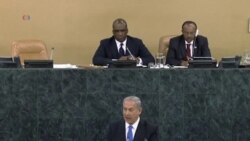UNITED NATIONS —
Israeli Prime Minister Benjamin Netanyahu says his country will never allow Iran to obtain nuclear weapons. Speaking on the last day of the U.N. General Assembly Tuesday, he cautioned the international community about Iran’s new president, saying his charm offensive is only a strategy to get crippling sanctions lifted. Iran's envoy lashed back, calling Netanyahu’s speech "inflammatory."
Delivering his UNGA address, Prime Minister Netanyahu immediately launched into his argument that Iran is not on the path of change, saying new President Hassan Rouhani is a “loyal servant” of the Islamic hardline regime and no different from his predecessor, Mahmoud Ahmadinejad.
“Rouhani doesn’t sound like Ahmadinejad. But when it comes to Iran’s nuclear weapons program, the only difference between them is this: Ahmadinejad was a wolf in wolf’s clothing; Rouhani is a wolf in sheep’s clothing. A wolf who thinks he can pull the wool over the eyes of the international community,” said Netanyahu.
He listed a catalog of Iran’s actions - from directly supporting President Bashar al-Assad in Syria to jailing and executing political dissidents - saying it's clear Iran has not changed.
On the nuclear file, he challenged the Iranian president’s remarks that his country is seeking nuclear energy only for peaceful purposes. Netanyahu pointed to the 2002 discovery that Iran was secretly building an underground centrifuge facility at Natanz and, in 2009, the uncovering of its enrichment facility in the mountains of Qom.
“Why would they do all this? The answer is simple: Iran is not building a peaceful nuclear program, Iran is developing nuclear weapons,” said Netanyahu.
He urged the international community to continue its pressure on Iran, saying sanctions are working and should remain in place.
‘Israel will stand alone’
Netanyahu was emphatic that Israel would never agree to nuclear weapons in Iran’s hands.
“Against such a threat Israel will have no choice but to defend itself. I want there to be no confusion on this point: Israel will not allow Iran to get nuclear weapons. If Israel is forced to stand alone, Israel will stand alone. Yet in standing alone, Israel will know that we will be defending many, many others,” said Netanyahu.
The Israeli prime minister focused his more than 30 minute speech on Iran, only mentioning peace talks with the Palestinians briefly at the end, saying he is ready to seek an historic compromise with them, but stressing it must satisfy Israel’s security concerns and include mutual recognition.
Netanyahu was the last to speak at the annual debate. His remarks were followed by the “right of reply” by nations wanting to respond to comments made during the debate. Iranian envoy Khodadad Seifi categorically rejected all of Netanyahu’s remarks.
“He [Netanyahu] should seriously avoid miscalculation about Iran. Iran’s centuries-old policy of non-aggression must not be interpreted as its inability to defend itself…. Therefore, the Israeli prime minister had better not even think about attacking Iran, let alone planning for that,” said Seifi.
The Iranian envoy also urged Israel to sign the Nuclear Non-Proliferation Treaty without delay, saying it is the only country in the region that is not a member.
Delivering his UNGA address, Prime Minister Netanyahu immediately launched into his argument that Iran is not on the path of change, saying new President Hassan Rouhani is a “loyal servant” of the Islamic hardline regime and no different from his predecessor, Mahmoud Ahmadinejad.
“Rouhani doesn’t sound like Ahmadinejad. But when it comes to Iran’s nuclear weapons program, the only difference between them is this: Ahmadinejad was a wolf in wolf’s clothing; Rouhani is a wolf in sheep’s clothing. A wolf who thinks he can pull the wool over the eyes of the international community,” said Netanyahu.
He listed a catalog of Iran’s actions - from directly supporting President Bashar al-Assad in Syria to jailing and executing political dissidents - saying it's clear Iran has not changed.
On the nuclear file, he challenged the Iranian president’s remarks that his country is seeking nuclear energy only for peaceful purposes. Netanyahu pointed to the 2002 discovery that Iran was secretly building an underground centrifuge facility at Natanz and, in 2009, the uncovering of its enrichment facility in the mountains of Qom.
“Why would they do all this? The answer is simple: Iran is not building a peaceful nuclear program, Iran is developing nuclear weapons,” said Netanyahu.
He urged the international community to continue its pressure on Iran, saying sanctions are working and should remain in place.
‘Israel will stand alone’
Netanyahu was emphatic that Israel would never agree to nuclear weapons in Iran’s hands.
“Against such a threat Israel will have no choice but to defend itself. I want there to be no confusion on this point: Israel will not allow Iran to get nuclear weapons. If Israel is forced to stand alone, Israel will stand alone. Yet in standing alone, Israel will know that we will be defending many, many others,” said Netanyahu.
The Israeli prime minister focused his more than 30 minute speech on Iran, only mentioning peace talks with the Palestinians briefly at the end, saying he is ready to seek an historic compromise with them, but stressing it must satisfy Israel’s security concerns and include mutual recognition.
Netanyahu was the last to speak at the annual debate. His remarks were followed by the “right of reply” by nations wanting to respond to comments made during the debate. Iranian envoy Khodadad Seifi categorically rejected all of Netanyahu’s remarks.
“He [Netanyahu] should seriously avoid miscalculation about Iran. Iran’s centuries-old policy of non-aggression must not be interpreted as its inability to defend itself…. Therefore, the Israeli prime minister had better not even think about attacking Iran, let alone planning for that,” said Seifi.
The Iranian envoy also urged Israel to sign the Nuclear Non-Proliferation Treaty without delay, saying it is the only country in the region that is not a member.





